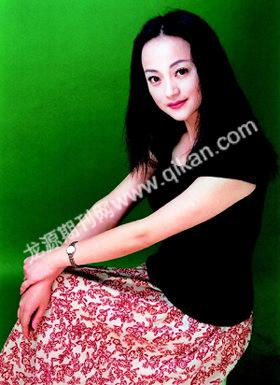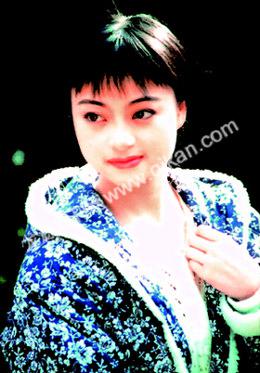Wang Adds Glory to Revived Opera
2009-06-30BaoDanhong
Bao Danhong

Wang Jinwen became an opera actress by accident, but her success as a master of Ningbo Opera is by no means by accident.
Wang rose to national fame by starring in “Pawned Wife”, a Ningbo Opera play that has won almost all the top national theater honors. When it was staged in Aachen, Germany, it brought down the house.
In 1966 Wang Jinwen was born into a family of geologists. When Wang reached middle school age, her parents decided that the daughter should not follow them across the province. So they sent her back to stay with her maternal grandmother in Ningbo in 1978. As Wang Jinwen was academically brilliant, a local middle school agreed to accept her.
The 15-year-olds life changed in the winter when the Ningbo Opera Troupe decided to recruit 18 youngsters across the city to revive the long-forgotten art. Thousands applied. A classmate of Wang Jinwen decided to try her luck. Wang Jinwen went with her classmate to sign up. While the classmate was filling out a form, Wang Jinwen caught the eye of a teacher who worked at a training course for the troupe. Seeing Wang Jinwen was beautiful with her big eyes, the teacher urged the 15-year-old to sign up. Wang said yes without much hesitation. She was recruited after rounds of auditions.
Thus Wang Jinwen started her career as a Ningbo Opera artist.
Ningbo Opera is a local art form that started in the early years of the Qing Dynasty (1644-1911). It enjoyed a regional reputation around Ningbo. As business people from Ningbo made themselves known in Shanghai in the early 20th century, the opera followed them to the metropolis. It flourished there and enjoyed the best booming years in its history. In the 1940s and 1950s, there were still more than 10 Ningbo Opera troupes in Shanghai. Then its glory passed into oblivion. When Wang Jinwen was recruited to learn the opera, Ningbo Opera Troupe was the only troupe in the country that staged plays in this opera genre. The 18 youngsters were the latest effort to revive the dying opera.

Wang Jinwen trained for four years at a training course and the training was tough. She tasted her first success when she was in the second year of the training course. She sang an aria of 108 lines on the stage of Hangzhou Opera House. Her singing brought down the house. Upon her graduation, she was naturally assigned to the Ningbo Opera Troupe. In her first few years, she was often assigned to standby roles, which gave her opportunities to watch veteran artists close at hand and learn from them.
In the autumn of 1989, the troupe staged a play at the fourth provincial theater festival in Hangzhou. Wang Jinwen did not get a chance to appear on the stage, but she was assigned to sing backstage. The audience and jurors noticed her singing though they did not see her. To honor her singing excellence, the jury committee invented a “backstage singing award” and gave her the special kudos. It was unprecedented in the history of the festival.
The first career breakthrough came in 1991 when she starred for the first time as lead woman in a Ningbo Opera play. Her interpretation of a Japanese girl was so convincing that she was granted a first-class award at a provincial competition.
Her national recognition came in 1996 when she was 30. In “Neighbors”, she acted as a blind child. To understand her role better, she lived with blind people at a local welfare factory for a while. Her performance of the blind child won her excellent critical review and best support actress at the 7th Shanghai White Magnolia Theater Festival.
Her performance at the festival in Shanghai was more than prize-winning. It opened her eyes to operatic possibilities for Ningbo Opera and her career. She decided to take an advanced course for directors at Shanghai Theater Academy. It proves to be a turning point in her career.
In 2000, Wang Jinwen was appointed director of the Ningbo Opera Troupe and her mission was to bring the opera back to its glory. The only way out for the opera was, in her opinion, to bring it to national recognition. “My Slave Mother” was recommended. Written in 1930s by Rou Shi, a writer from rural Ningbo, the story relates a poverty-stricken family that had to pawn the wife as a concubine to a local landlord for surrogate pregnancy and produce a son.
Wang Jinwen decided to have a go at the story. Luo Huaiyu, a prominent playwright at Shanghai Theater Academy, was invited to adapt the story, for Wang attended his course at the academy and embraced the playwrights belief that traditional plays should be modernized and regional plays should cater to urban audiences.
The adaptation took shape in a year after the playwright visited Ninghai six times and studied life and tradition there. The tragedy portrays a woman whose motherhood was deprived by harsh life again and again. With the assistance of the playwright, Wang Jinwen invited prominent experts to direct, compose music, choreograph, design lighting and costume.
After rehearsal for four months, the premier in Ningbo in June 2002 brought down the house and won long standing ovations. Then the play ran for more than 100 performances across the mainland, Taiwan, Hong Kong as well as Germany and Hungary.
The play won all the top national and provincial prizes and Wang Jinwen won all the top national and provincial prizes. Moreover, the success of the “Pawned Wife” has revived Ningbo Opera. In June 2008, the local opera was put on the second list of national intangible cultural heritages by the State Council for conservation and protection. □
